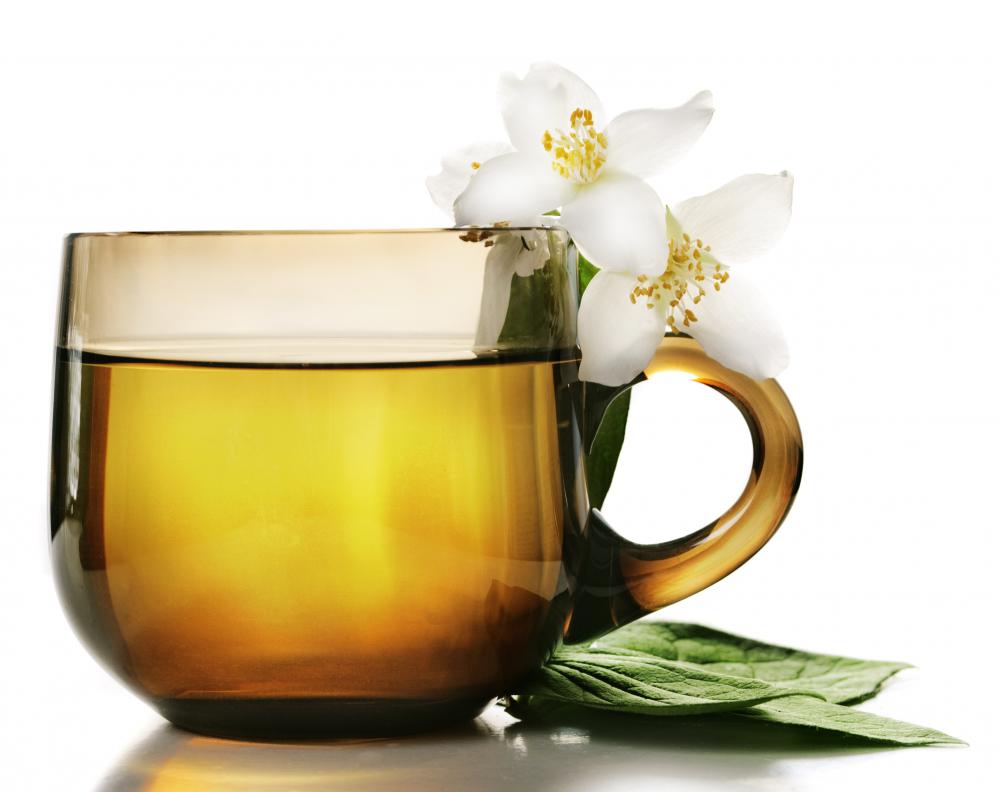At WiseGEEK, we're committed to delivering accurate, trustworthy information. Our expert-authored content is rigorously fact-checked and sourced from credible authorities. Discover how we uphold the highest standards in providing you with reliable knowledge.
What are the Different Types of Ayurvedic Tea?
Ayurvedic tea is made from herbs, spices, fruits and many other plants. The tea is uniquely formulated to help restore a healthy balance in the mind and body. Medicinal teas and relaxant or soothing teas are formulated to help with certain health problems, both of the body and mind. There are also many types of Ayurvedic teas that compliment the three Doshas known as Vata, Pitta and Kapha. One can purchase Ayurvedic tea blends in loose-leaf teas or in tea bags for convenience.
Ayurveda medicine believes that each of the three Doshas needs a different blend of herbs in order to restore a healthy balance in the body and mind. Herbal teas that complement all three Doshas include natural herbs such as fenugreek, licorice root, amalaki, triphala and trikatu. Teas designed for the Vata Dosha include herbs such as ashwagandha, ginger, cardamom and cinnamon. For the Pitta Dosha, popular ingredients include amalaki, chandana, cumin, coriander, fennel and rose petals. Tulsi, dalchini, shunthi, dry ginger, dill seeds and cloves are helpful for restoring a balance for the Kapha Dosha.

Medicinal teas are often used in Ayurvedic therapy because they are uniquely formulated to help with certain health conditions such as poor digestion, excess weight, diabetes and asthma, as well as liver and kidney problems, heart conditions and a weak immune system. Laxative, detoxing and diuretic teas and teas for digestion can work together to help with weight loss. A diuretic tea can also help with kidney problems, because it helps to flush out toxins that contribute to the formation of kidney stones. Teas designed for the heart can help to regulate blood pressure and the heart rate, and it can protect the heart from high cholesterol levels.

A rejuvenation tea made with guduchi, amalaki, ashwagandha and shunthi can help to strengthen the immune system, which in turn can help fight fatigue and other health problems. A relaxant or soothing Ayurvedic tea blend can help to calm the nervous system, allowing the mind to fall into a more restful sleep at night. It can also help to fight anxiety, depression and mood disorders. The ingredients often include brahmi, sarpagandha, shankhpushpi, shatawari, dalchini and guduchi.

Making Ayurvedic tea is very simple, because one can purchase the tea in tea bags or in a loose-leaf tea mix. Herbs, spices and other tea ingredients can also be purchased separately, which allows one to create unique tea blends at home. The tea bags or the loose tea are placed in a container with hot water and allowed to steep from five to 10 minutes, or longer if a stronger flavor is desired. Ayurvedic tea can be naturally sweetened with honey, maple syrup, sugar cane or any other Ayurvedic sweetener.
AS FEATURED ON:
AS FEATURED ON:




















Discussion Comments
There are different types of Ayurvedic teas out there and not just for the different Doshas. There are also Ayurvedic teas made for specific ailments and disorders.
It's a good idea to consult with an Ayurveda practitioner before trying Ayurvedic tea. The practitioner will first do some tests to determine the needs of the patient. Although there are three main doshas, each individual is a little different with different needs.
A tea prepared by an Ayurveda practitioner will be best.
@ysmina-- I personally use a pre-prepared Ayurvedic tea in tea bags. I'm a Vata and I buy my Vata tea online. These types of Dosha teas are very common now and easy to find.
I suppose you could get the ingredients yourself but it may be difficult to get the amounts right. It's much easier to use tea with ingredients that have already been mixed and prepared. And the tea truly works.
I've been experiencing both physical and emotional issues because of a dosha imbalance. I took the dosha test and found out that I have too much of Vata. Vata tea helps. I feel calmer, happier and healthier when I drink the tea.
I'm a Pitta. Should I purchase an Ayurvedic tea formulated for Pitta Dosha or should I purchase and combine the ingredients myself for a homemade tea?
An what if I'm fond of herbs and spices that are recommended for the other Doshas? Can I not have them?
Post your comments